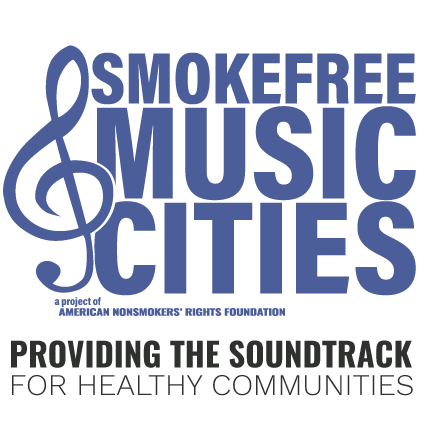More organizations associated with protecting musicians’ health and livelihoods have adopted resolutions in support of expanding the number of Smokefree Music Cities. The Atlanta Blues Society, Nashville Musicians Association, American Federation of Musicians in New Orleans, and MusiCares, the Recording Academy’s charity that provides a safety net of critical assistance for music people in times of need, have taken a stance to protect musicians health by supporting smokefree environments. Each of these organizations recognize that secondhand smoke exposure is dangerous to musicians’ health and that “major music cities such as Austin, TX, Branson, MO, Chicago, IL, Los Angeles, CA, New Orleans, LA, New York City, NY and more are 100% smokefree cities and thriving economies.”
Musicians, music professionals, and other entertainers perform in a variety of venues including theaters, clubs, casinos, and bars, and are regularly exposed to secondhand tobacco smoke and e-cigarette aerosol if there is no 100% smokefree law or policy governing those spaces.
Musicians exposure to secondhand and thirdhand smoke is dramatically higher than most other workers; in fact, secondhand smoke levels in smoke-filled bars, clubs, and casinos are significantly (400-600 percent) higher compared to offices. Performing in a smoke-filled venue irritates vocal chords, eyes, nose, and ears, making it difficult to give their best performance and compromises their health and well-being. This exposure puts musicians at a higher risk for acute and long-term health complications including heart disease and cancer.
Smokefree venues help protect musicians and the public from exposure to secondhand smoke and secondhand e-cigarette aerosol; smokefree cities provide protection for every worker in every type of workplace.
You can show your support for the health and safety of musicians, music professionals, and other performing artists by adopting a resolution, sharing your story as a fan or a performer, and sharing our information about the hazards of secondhand smoke and the benefits of smokefree air with your friends, family, and social networks. The more we communicate about the need for smokefree air and how to successfully go smokefree, the more likely we can clear the air and protect everyone’s health.
See our Resources page for our model resolution and examples of adopted resolutions!

